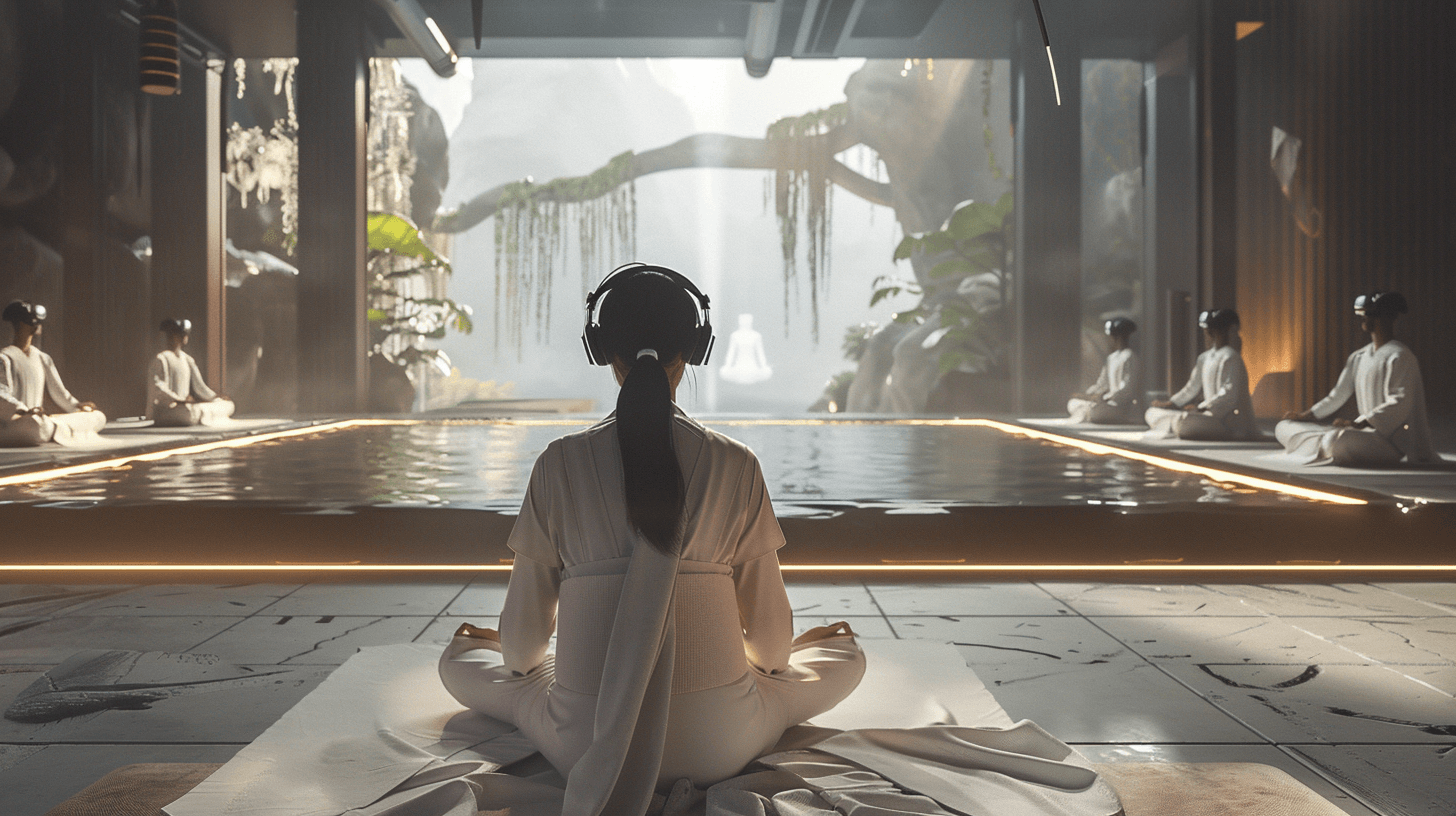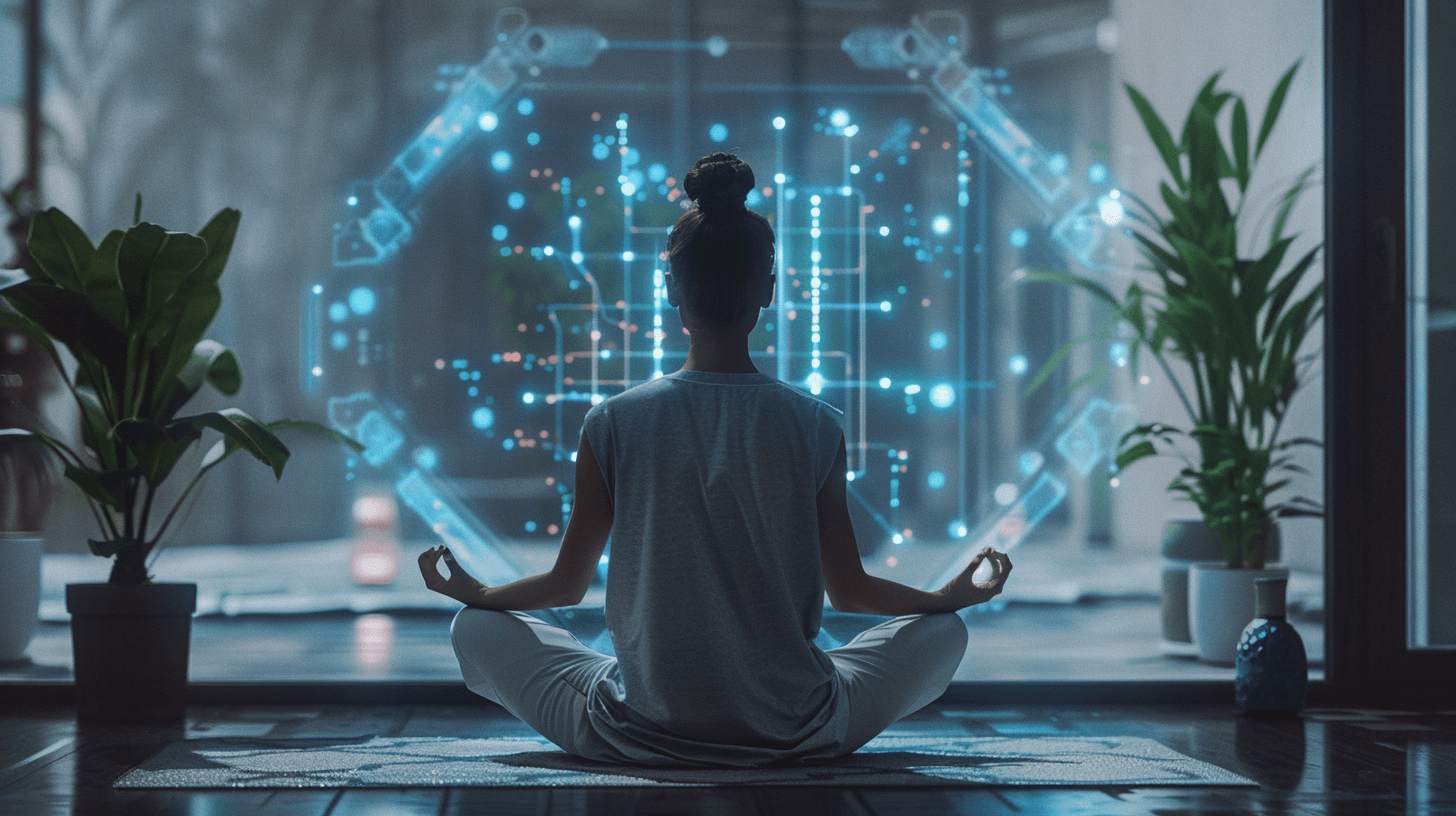Introduction: The Convergence of Tradition and Technology in Meditation

Meditation, a practice with ancient roots spanning thousands of years and diverse cultures, has evolved significantly to meet the changing needs of its practitioners. Originally developed as a spiritual practice in Eastern religions, meditation has transcended its initial religious confines to become a mainstream tool for relaxation and self-improvement embraced worldwide. As it has woven its way through historical timelines, each era has marked its evolution with new interpretations and methodologies that reflect the zeitgeist of that period.
Today, we stand on the brink of a thrilling new phase—where technology, especially Artificial Intelligence (AI), is beginning to play a crucial role in personal development and wellness. AI’s integration into the meditation sphere represents a pivotal shift, offering tools that promise to deepen the practice and overcome some of the traditional challenges associated with advanced meditation. Imagine yourself as a seasoned meditator who, despite years of practice, finds yourself hitting a plateau. Common obstacles such as maintaining deep focus, achieving greater depths of meditation, or managing external and internal distractions can sometimes seem insurmountable.
This is where AI steps in. With its ability to analyze vast amounts of data and provide personalized feedback, AI can offer unique insights into your meditation patterns. These can range from suggesting the optimal time of day for your sessions based on physiological cues to adapting meditation techniques to better suit your emotional and physical responses. By addressing specific challenges like these, AI not only rejuvenates your practice but also propels it to new heights, making meditation more effective and personally tailored than ever before.
In this article, we will explore how AI is not just enhancing traditional meditation practices but transforming them, allowing you to break through plateaus and achieve deeper, more effective states of meditation. Let’s delve into the role of AI in modern meditation, understanding how it can become a vital part of your journey toward wellness and self-discovery.
Understanding Meditation at an Advanced Level

Advanced meditation transcends the fundamental techniques learned by beginners, requiring a deeper level of mental discipline and a mastery of techniques that elevate awareness and consciousness. While beginning meditators may focus on developing basic skills like maintaining focus on a single point or managing breathing, advanced practitioners engage with meditation on a more profound level. This includes understanding and manipulating the subtler effects of meditation on the mind and body, achieving states that are deeply transformative.
However, as one progresses to advanced stages, unique challenges may arise. Many experienced meditators reach plateaus where further progression seems elusive. The focus needed at this level is more intense, and the distractions, although subtler—like deep-seated emotional residues or ingrained thought patterns—can be more difficult to manage. It is here that artificial intelligence (AI) can play a pivotal role.
AI technology, with its capability for personalized feedback and advanced data analysis, offers unique solutions that are tailored to individual needs. By leveraging AI, practitioners can receive insights into their meditation patterns, suggestions for overcoming personal barriers, and adaptive programs that evolve as they do. This personalization extends beyond generic advice, providing actionable guidance that is specifically crafted to help break through plateaus and deepen meditation practices.
The benefits of engaging with meditation at this advanced level are substantial, impacting both psychological and physical health. Practitioners often report enhanced mental clarity, improved emotional resilience, and a deeper sense of overall well-being. These benefits are not just felt during meditation but permeate various aspects of everyday life, improving decision-making, stress management, and personal relationships.
As you, the reader, consider integrating AI into your meditation practice, envision the potential transformations. Imagine a meditation practice that adapts to your emotional state and physical conditions, offering you the most effective techniques in real time. The incorporation of AI could not only rejuvenate your existing practices but also propel them to new heights, providing you with deeper insights and more consistent progress.
In this section, we have explored what it means to practice meditation at an advanced level and how AI can help overcome some of the specific challenges faced by seasoned meditators. As you continue on your meditation journey, think of AI as a tool in your arsenal, ready to help you achieve your meditation goals and enhance your overall well-being.
Unwind and Renew: Mastering Mindfulness for Ultimate Relaxation
The Intersection of AI and Meditation

As we delve into the realm of artificial intelligence (AI), it’s essential to demystify this technology for those who might not be tech-savvy. At its core, AI involves machines designed to perform tasks that typically require human intelligence. These tasks are managed through capabilities such as learning from data, recognizing patterns, and making decisions. AI’s strength lies in its ability to analyze vast amounts of information and learn over time, improving its accuracy and effectiveness without human intervention.
In the health and wellness industry, AI has found a particularly impactful role. For meditation, AI technologies offer personalized guidance by analyzing your previous sessions, current mood, and physiological signals like heart rate or breathing patterns. This allows for real-time adjustments to your meditation experience, enhancing its depth and effectiveness. For example, an AI-powered meditation app might suggest switching your meditation technique based on the stress levels it perceives through your biometric data, ensuring you achieve the maximum tranquility possible during each session.
Several AI tools in the market are transforming how individuals engage with meditation. Apps like ‘Calm AI’ and ‘MeditateMe AI’ use sophisticated algorithms to adapt meditation content in real-time, providing users with a highly personalized meditation journey. Users of these apps often report increased ability to focus, deeper relaxation, and a more fulfilling meditation experience. “Since using AI-assisted meditation, I’ve been able to reach a level of calmness I struggled to find before,” shares one user, highlighting the practical benefits of integrating AI into meditation practices.
The potential of AI to revolutionize meditation is immense. By making meditation more accessible and tailored, AI can help overcome common challenges such as maintaining consistency and achieving deeper states of meditation. Imagine integrating AI into your meditation routine—where each session is customized to your current mental and physical state, potentially increasing the effectiveness of each session manifold.
As we continue to explore advanced meditation supported by AI, it becomes clear that these technologies are not just additions but essential tools that can significantly enhance our meditation practices. By embracing AI, we open ourselves to a world where meditation is more adaptable, insightful, and aligned with our personal needs, making it an even more powerful tool for mental and physical well-being.
Transforming Wellness: The Top 10 AI Innovations Shaping Health Today
Top AI Tools for Advanced Meditation
In the rapidly evolving world of meditation technology, several AI-driven apps and software stand out, offering unique features that cater specifically to the needs of advanced practitioners. Let’s delve into some of the leading tools in the market, examining their key features, how they leverage AI to enhance meditation, and their reception among seasoned meditators.
Mindful AI:
Features: Utilizes machine learning to adapt meditation sessions based on user feedback and physiological data.
Unique Selling Points: Offers real-time mood adjustment using biofeedback sensors to measure stress levels and adjust sessions accordingly.
User Feedback: Users appreciate the adaptive nature of the app, noting significant improvements in stress management and deeper meditation states.
ZenSync:
Features: Combines guided meditations with AI-driven analytics to track progress and suggest new meditation paths.
Unique Selling Points: Integrates with wearable devices to monitor heart rate and breathing, personalizing sessions for optimal relaxation and focus.
User Feedback: Long-term users report enhanced meditation depth and a more tailored experience that grows with their practice.
Comparing AI-Enhanced Tools with Traditional Meditation Aids Traditional meditation aids like guided CDs, books, and in-person classes have long been staples in the practice. However, AI-enhanced tools offer distinct advantages:
- Accessibility: AI apps can be accessed anytime and anywhere, removing the need for scheduled classes or physical media.
- Personalization: Unlike static guides, AI tools adapt to the individual’s current state and needs, providing a highly personalized experience.
- Engagement: With interactive features and real-time feedback, AI tools keep the practitioner engaged and motivated throughout their journey.
Despite these advantages, traditional methods still hold value for those who prefer a tactile or communal meditative experience, highlighting the need for a balanced approach depending on personal preferences and goals.
Expert Insights and Future Directions
Interviews with developers of leading AI meditation tools like Headspace and Ogimi reveal a concerted focus on enhancing user experience and expanding accessibility. These platforms are pioneering the use of advanced predictive analytics and machine learning to tailor meditation practices to individual needs, even before users are fully aware of these needs themselves.
Headspace, a leader in the meditation app market, has refined the personalization of meditation through machine learning algorithms. These algorithms analyze user interactions, meditation frequency, and individual feedback to customize experiences. This capability allows Headspace to offer increasingly personalized suggestions that evolve with the user’s meditation journey, enhancing user engagement and effectiveness.
Similarly, Ogimi introduces a unique approach by providing AI-guided, real-time personalized meditation coaching. This platform uses OpenAI’s GPT-4 technology to generate meditation sessions tailored to individual preferences and progress. Each session with Ogimi is akin to having a personal meditation coach, offering one-on-one guidance that adapts to the user’s specific emotional and psychological needs.
These examples underscore a broader trend within the AI meditation field towards developing tools that not only respond to user feedback but anticipate user needs to foster a more profound and effective meditation experience. Long-term users of these platforms have noted significant breakthroughs in their practice, overcoming plateaus and engaging with meditation in more meaningful ways.
As AI technology continues to evolve, experts predict that the integration of even more sophisticated AI features, such as augmented reality meditation environments and biometric data integration, will further transform the landscape. These advancements promise to make meditation more accessible and customized, potentially changing how we understand and practice meditation.
By staying attuned to these developments, users can expect AI to continue to revolutionize their meditation practices, making personal growth and wellness more attainable than ever.
How AI Can Personalize Your Meditation Journey

In the evolving landscape of meditation technology, Artificial Intelligence (AI) plays a pivotal role in personalizing meditation experiences to meet individual needs. By leveraging cutting-edge technologies such as machine learning, data analytics, and biofeedback sensors, AI systems are capable of tailoring meditation sessions specifically for you. These tools analyze your meditation data over time, adapting techniques to better suit your evolving needs and responding in real-time to your emotional and physical states.
For example, biofeedback sensors can monitor your heart rate and breathing patterns, allowing the AI to adjust your meditation session if it detects signs of stress or distraction. This level of customization ensures that your practice aligns perfectly with your current mental and physical state, enhancing the overall effectiveness of each session. The ultimate goal is to provide a meditation experience that not only adheres to your personal wellness goals but also evolves with them.
Many users have reported significant benefits from this personalized approach. For instance, John, a long-time meditator, shares, “Since integrating AI into my practice, I’ve noticed a marked improvement in my ability to manage stress. The AI suggestions help me focus deeper and relax more quickly, adapting to the day’s specific challenges.” Another user, Lisa, reports, “The AI’s ability to tweak my sessions based on how I’m feeling has been revolutionary. It feels like having a personal meditation coach who knows exactly what I need.”
The personal testimonials highlight the tangible benefits of AI in meditation: enhanced stress management, improved focus, deeper relaxation, and greater overall satisfaction with the meditation journey. These stories underscore how AI not only enhances the meditation experience but also contributes to emotional resilience and personal growth.
Ethical Considerations and Privacy in AI-Enhanced Meditation

As meditation practices increasingly integrate AI technologies, understanding the ethical implications, particularly regarding data privacy, becomes crucial. AI meditation tools are designed to personalize experiences and enhance effectiveness, requiring access to sensitive personal data such as physiological and behavioral information. This data can include everything from your heart rate and breathing patterns during meditation to more comprehensive behavioral analytics derived from your usage patterns. While these data points are invaluable for tailoring experiences, they also raise significant privacy concerns. The risks of data breaches or misuse of this information could have serious implications for users’ privacy and security.
In response to these challenges, developers of AI meditation tools are actively implementing robust measures to protect user data. Encryption technologies are commonly used to secure data both in transit and at rest, ensuring that personal information remains protected from unauthorized access. Furthermore, many developers utilize secure data storage solutions and adhere to strict data governance policies that comply with international standards, such as the General Data Protection Regulation (GDPR). Transparency in how data is used and shared is also a cornerstone of ethical AI tool development, with many companies providing clear, user-friendly privacy policies and terms of use.
As a user, it is imperative to make informed decisions when selecting AI-supported meditation tools. Look for apps and software that offer transparent privacy policies and give you control over your personal data. Check whether these tools allow you to access, modify, or delete your data and whether they provide options to opt out of data collection that is not essential to the functionality of the app.
The responsibility to uphold ethical standards in AI meditation tools does not rest solely on the developers. As a user, staying informed about your choices and understanding the privacy implications of the tools you use is equally important. By being proactive about your data privacy, you can enjoy the benefits of personalized AI-enhanced meditation without compromising your personal information.
Future Trends in Meditation and AI

As we stand on the brink of new technological revolutions in the realm of meditation, insights from experts in AI and meditation reveal an exciting future. These specialists predict a seamless integration of advanced AI features into meditation practices, such as the use of augmented reality environments that offer immersive meditation experiences and the incorporation of genetic information to tailor meditation techniques to individual biological profiles.
Upcoming advancements are set to redefine the accessibility and effectiveness of meditation. Innovations such as AI-driven biofeedback mechanisms are being developed to adjust meditation settings in real-time, responding to physiological data like heart rate and stress levels. Additionally, the emergence of AI coaches employing natural language processing could soon provide verbal guidance during meditation sessions, mimicking a human instructor’s responsiveness but with the scalability and personalization that only AI can offer.
To ensure you remain at the forefront of these developments, consider engaging with the digital community focused on meditation and AI. Subscribe to newsletters from leading AI research institutions, follow relevant blogs, and participate in online forums where new technologies and their applications in wellness are discussed. Staying informed will allow you to leverage the full benefits of AI-enhanced meditation as new tools and features become available.
Getting Started with AI in Your Meditation Practice

Integrating AI tools into your meditation routine can significantly enhance your practice, making it more personalized and effective. Here’s a step-by-step guide to help you begin this transformative journey:
Step 1: Define Your Goals and Assess Your Practice Start by identifying what you want to achieve with meditation. Are you looking to reduce stress, enhance focus, or perhaps develop a deeper understanding of your mental patterns? Assess your current meditation practices to determine what’s working and what might be improved. This assessment will guide you in choosing the right AI tool that aligns with your goals.
Step 2: Research and Select the Appropriate AI Tool Once your objectives are clear, research AI tools that cater to your specific needs. Look for tools that match your meditation level, whether you’re a beginner or an advanced practitioner. Pay attention to features that will help you achieve your desired outcomes, such as tools that offer guided meditations, biofeedback, or mood tracking.
Step 3: Integrate the AI Tool into Your Routine After selecting an AI tool, begin integrating it into your daily practice. Start with the basic features to get comfortable with the technology. For instance, if your tool includes biofeedback capabilities, start by monitoring your heart rate or breathing patterns during meditation sessions. Gradually explore more complex features as you become more accustomed to the tool.
Tips for Making the Most of Your AI Tool:
- Understand the Features: Take the time to learn about all the features your AI tool offers and how they can enhance your meditation.
- Adjust Based on Feedback: Use the AI’s feedback to refine your meditation techniques. For example, if the tool suggests that your mind wanders more at certain times of the day, consider scheduling your meditation sessions accordingly.
- Experiment with Settings: Don’t hesitate to tweak the settings to better suit your preferences and improve your meditation experience.
Choosing the Right AI Tool: When selecting an AI meditation tool, consider:
Ease of Use: Ensure the tool is user-friendly and easy to navigate.
Compatibility: Check if the tool is compatible with your existing devices.
Cost: Evaluate whether the cost fits your budget and whether the features justify the price.
Data Privacy: Understand how your data will be used and ensure the tool complies with privacy regulations.
Conclusion: Embracing the Future of Meditation with AI
As we have explored throughout this article, the integration of artificial intelligence into meditation practices offers profound benefits and transformative potential. AI technologies have the power to personalize and enhance your meditation experience by adapting to your individual needs, monitoring your physiological and emotional responses, and providing data-driven insights that refine and deepen your practice. This personalized approach helps in achieving a more focused and effective meditation session, tailored just for you.
The implications of embracing such technology extend far beyond the meditation cushion. AI represents a broader shift towards more personalized, tech-driven health solutions that can significantly improve our quality of life. By integrating AI into your wellness routine, you are at the forefront of a movement that leverages technology to foster deeper personal growth and health.
Now, I invite you to take the next step. Explore AI meditation tools firsthand and share your experiences with these technologies. Your feedback is invaluable—not only to you and your community but also to the developers who are continually looking to improve these tools. Participate in online forums, leave reviews, or join discussions on social media platforms. Engage with a community of like-minded individuals who are all exploring the innovative intersections of technology and wellness.
By doing so, you contribute to a larger movement towards innovative wellness practices. Your active participation is crucial for not only personal growth but also for shaping the future of meditation technology. Embrace this opportunity to transform your meditation practice and, ultimately, your life, with AI.
Together, let’s navigate this exciting frontier, harnessing the power of AI to make meditation a more impactful part of our daily lives.







